Asher Imtiaz is the kind of person who always seems to be wandering into a great story.
Like the time in 2017, when the Pakistani American computer scientist and documentary photographer walked into a Target in Nebraska and ended up being invited to a wedding thrown by Yazidi refugees from the Middle East.
Imtiaz had gone to Nebraska to shoot pictures of life in small-town America in the age of Trump, far from the country’s urban centers. Among his portfolio from the time is another Yazidi family, dressed in patriotic garb and heading to a Fourth of July picnic.
“I went to see America and found these new Americans,” said Imtiaz at a coffee shop on the north side of Milwaukee last year.
Imtiaz fits right in at Eastbrook Church, a multi-ethnic congregation where he serves as a volunteer leader at an outreach ministry for international students at the University of Wisconsin-Milwaukee campus nearby.
Your tax-deductible gift helps our journalists report the truth and hold Christian leaders and organizations accountable. Give a gift of $30 or more to The Roys Report this month, and you will receive a copy of “Hurt and Healed by the Church” by Ryan George. To donate, click here.
Eastbrook may be an outlier these days, a place where refugees, immigrants and international students are welcome at a time when American evangelicals are increasingly suspicious of newcomers to the United States.
According to data from the Public Religion Research Institute’s Immigration Policies Survey, nearly 6-in-10 (59%) white Evangelical Protestants agreed with the statement “Immigrants are invading our country and replacing our cultural and ethnic background.” By contrast, only 31% of Americans overall agreed with that statement.
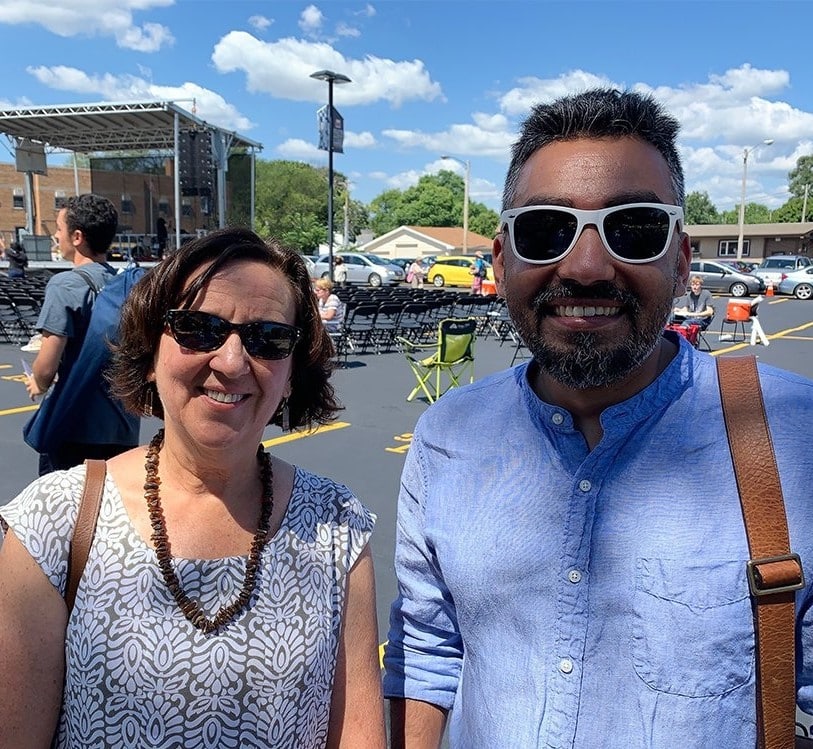
At an outdoor service at Eastbrook in August, Imtiaz wandered through the congregation greeting friends and exchanging hugs as a diverse worship team led the congregation through a mix of traditional and contemporary songs.
The service started with the singing of the traditional Doxology, which begins, “Praise God from whom all blessings flow,” followed by songs like “You Are Good” and “Way Maker,” by Nigerian gospel singer Sinach.
That was followed by a reading of Psalm 23 in English, Spanish and Yoruba.
The church was founded in 1979 by members of Elmbrook Church, a megachurch about 20 miles to the west. Elmbrook’s then pastor was hoping to get church members more involved in the communities where they lived. Dubbed Eastbrook, it was led for three decades by former missionaries Marc and Nancy Erickson. For the past 11 years the pastor has been Matt Erickson (no relation).
The proximity of the university campus led to an intentional outreach to college students, especially those from overseas, which continues four decades later.
Every fall, church members give tours of Milwaukee to newly arrived international students, who are then invited to have dinner at the homes of church members. Many of those students come from Christian backgrounds and are seeking to connect with a church, said Imtiaz, who was raised as an Anglican in Pakistan, a country where only about 2% of the population is Christian.
Those students are also looking for friendship. Imtiaz pointed to a 2012 study of international students in the South and Northeast, which found that 40% of those students had no close friendships with Americans. Through the outreach at Eastbrook, their students often make friends in their first days in the country. Many of them end up spending holidays with church members and making longtime friendships.
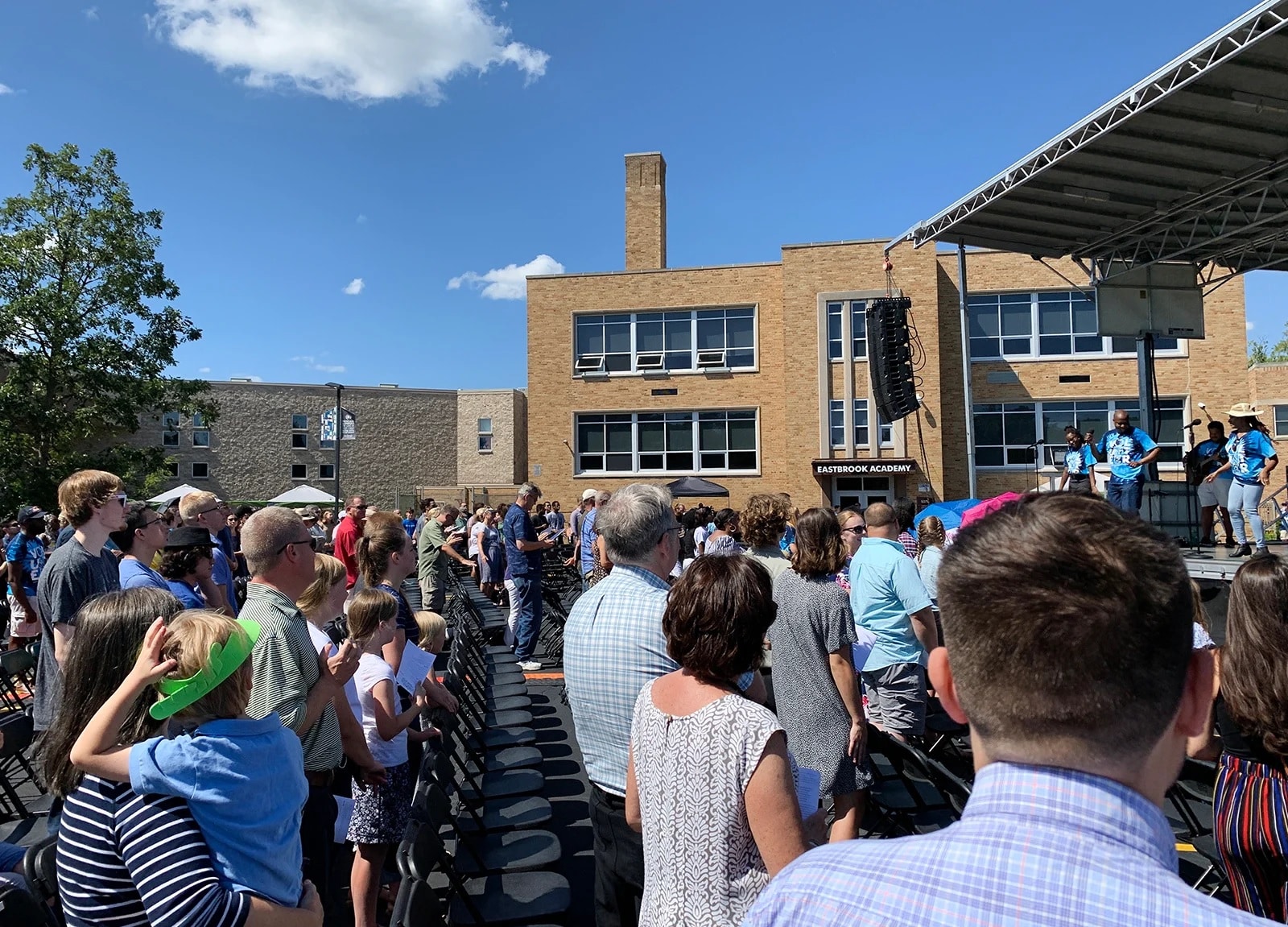
“It’s basically providing a home away from home,” he said.
The church also operates an International Community Center on the south side of the city, where a number of recent refugees and other immigrants have settled. The center teaches English as a Second Language classes and provides support with issues like housing and education. About 30 people will end up dropping by the center most days, Dan Ryan, senior director of mission at the church, said in an interview in early January 2022.
Ryan said the church is helping resettle some recent refugees from Afghanistan. He understands that some of his fellow evangelicals around the country are resistant to the idea of resettling refugees. Since refugees are here in the States, he said, churches need to reach out in love.
“Yes, have your political ideas,” he said. “But don’t lose sight of the people involved.”
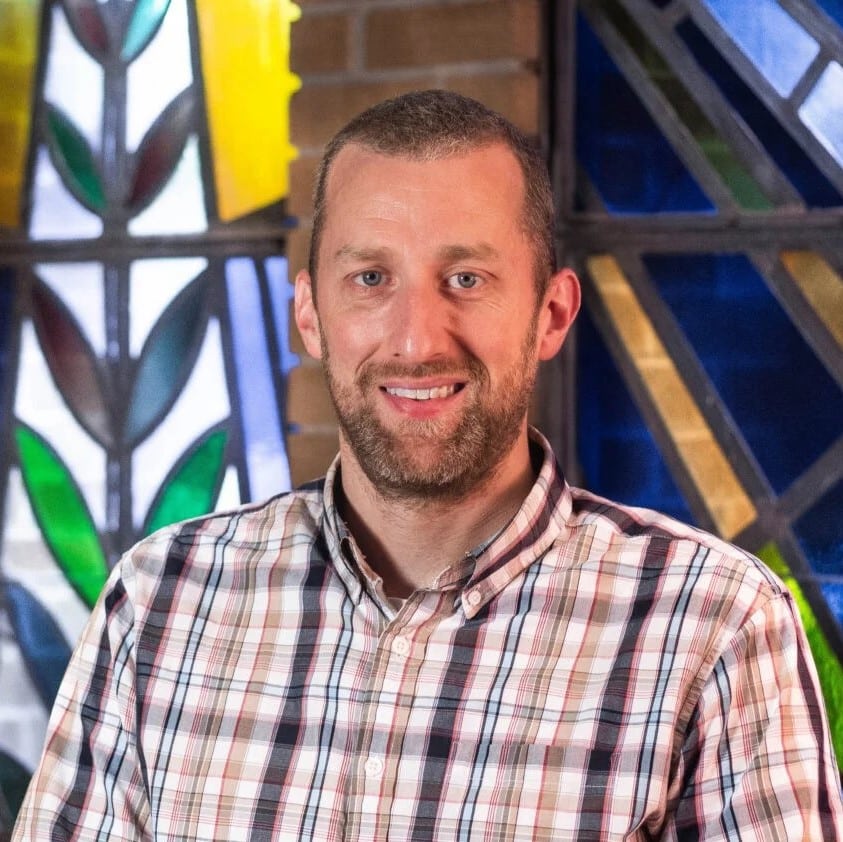
Ryan said that the church and the center are very open about the Christian motivations for their outreach efforts. But they also steer clear of proselytizing. Their main goal, Ryan said, is to show love and welcome to their new neighbors, a point echoed by Matt Erickson.
“It’s a ministry of care and concern and tangible ways of loving people welcoming people,” he said.
“These folks are treasured by God and valuable in his sight,” said Erickson, who spent several years on the staff of World Relief, a Christian organization that helps resettle refugees in the United States.
While he’s not shy about talking about faith, Imtiaz doesn’t see himself as a “Christian photographer.” He said that Christians in the United States sometimes see their neighbors as “projects” or prospective converts, rather than seeing them as people first. He takes a slower approach, trying to befriend people and see them as a neighbor who is valuable in God’s sight.
As a photographer, Imtiaz practices something he calls “God at ‘I’ level” — trying to connect with the people he photographs as human beings, long before taking their picture.
Like many churches in the United States, Eastbrook has felt the pressure of the country’s political polarization inside the church. Erickson said that Eastbrook has always tried to bring together people from different backgrounds, as task made more difficult by the broader conflicts in American public life over race, politics and increasingly, COVID-19.
He often turns to a verse from the New Testament Book of Galatians, in which the apostle Paul urges his readers to “bear one another’s burdens.”
“The last couple of years have given us lots of opportunities to live that out,” he said. “Sometimes we are doing it well and sometimes we are not. Part of being a body is that we have to learn to talk with each other, and we have to learn how to understand each other.”
During his sermon at the outdoor service in August, Erickson urged church members to ground their lives in the Bible and its message of love, rather than on the noise of the outside world. Without that solid foundation, he said, their lives won’t reflect the kind of love God wants them to share.
“Brothers and sisters, I just want to ask us today, are we giving more time to the news, are we giving more time to social media than we are to the Word of God and letting it sink into our lives?” he said. “I’m not trying to be legalistic. I’m just sick of us being brainwashed and want us to stand in the kingdom.”
Among the people at Eastbrook that Sunday were Mahitha Voola and Manna Konduri, both originally from India, who came to Eastbrook through the church’s outreach to international students and ended up staying after graduation.
From the beginning, people at the church made them feel at home.
“They say, ‘Oh, taste and see the Lord is good,’” Voola said, quoting a verse from the Psalms. “I’ve tasted that love of God through these people and through the church. I feel very blessed to be part of it.”
The two said they hope to pass on the welcome they have received.
“Today we are the recipients of this love,” Konduri said. “Tomorrow, maybe we will be the ones to show that to someone else.”
Eastbrook’s ethic of welcome, Imtiaz said, has been as much a boon for him as it is for the newcomers.
He’s particularly interested in documenting the story of immigrants and refugees, whom he likes to refer to as “new Americans.” For several years he lived in an apartment complex where newly resettled refugees were living so that he could get to know them. He ended up photographing a number of neighbors after building friendships. When he got COVID-19 — a mild case — one of his former neighbors, a woman from Iraq, would send him soup.
Imtiaz hopes that his photographs and work at the church will inspire people to get to know their neighbors, no matter where they come from.
“If I can go to Nebraska and go to Target and meet 400 Yazidis, anybody else can,” he said.
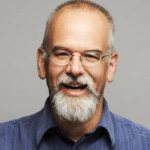 Bob Smietana is a national reporter for Religion News Service.
Bob Smietana is a national reporter for Religion News Service.




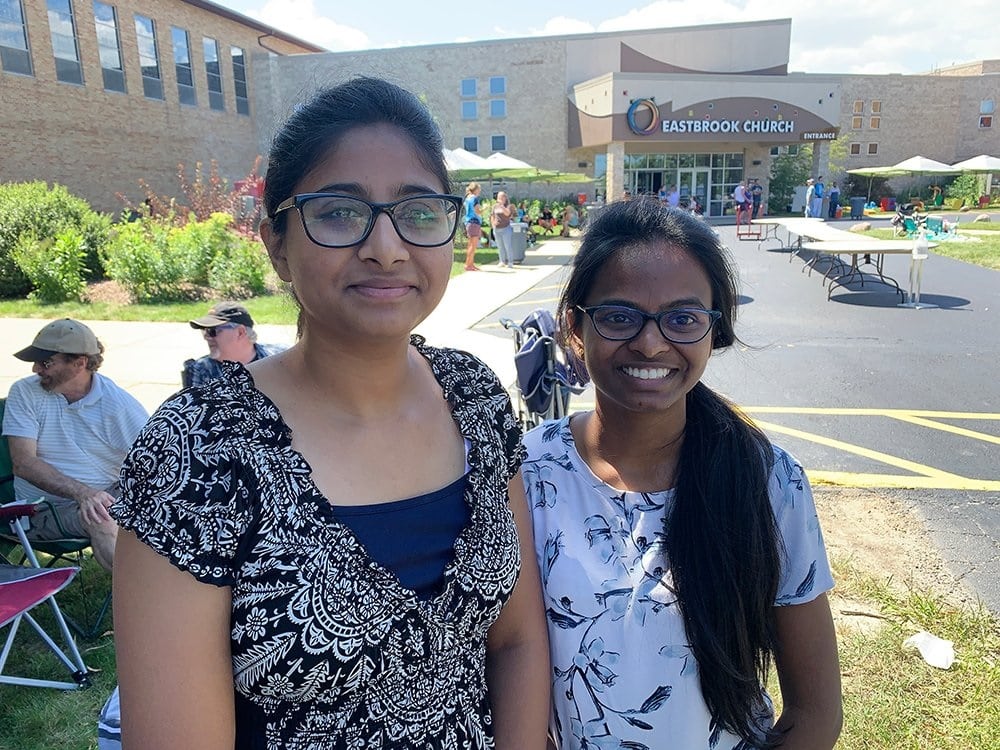
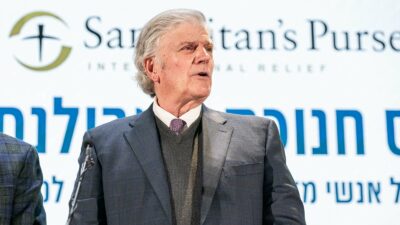
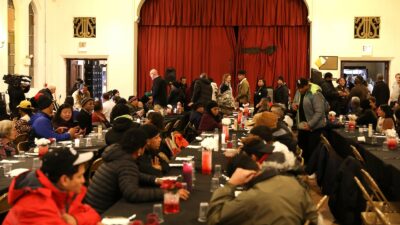


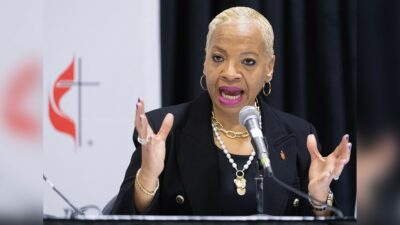



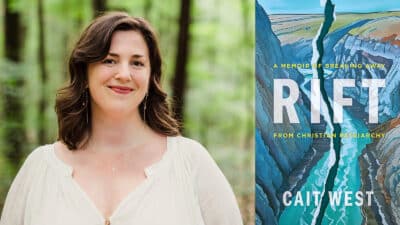






15 Responses
This story starts with the narative that evangelicals are anti immigrant. I call BS on this narrative.
I am an immigrant from India.. I have lived in the South Dakota and Iowa for the last 17 years. I have been a member of evangelical congregations all of that time, and to various evangelical events around this region. I have never been treated poorly by evangelical churches. On the other hand the few times I have had poor treatment, they have been at mainline churches.
In recent years I have reached out to various evangelical churches around the regoin with opportunities to help and reach out to immigrant populations. I have always had welcoming participation and enthusiastic response.
This is false narrative propagated by the media. I and the many fellow immigrant evangelical Christians of mine can attest to that.
Eastbrook is not an outlier. Eastbrook is the norm in evangelical churches atleast in the Midwest region especially SD and IA. I know this truth won’t sell as many copies as the lie that evangelicals are anti immigrant.
Sad to see such falsehood propogated by Julie Roy
Thank you for your comment. I am happy to hear that your experience has been so positive in evangelical churches. The reporter was basing that statement on a Pew Study, which found 6 in 10 evangelicals agreed with the statement: “Immigrants are invading our country and replacing our cultural and ethnic background.” I have changed the wording from “is a bit of an outlier” to “may be an outlier.” I think the study suggests the latter. But without a broader study of immigrant experiences at a representative sample of churches, that’s a hard statement to verify.
As someone who lived in South Dakota for 24 years and then Milwaukee for the past 15 years, I understand what you’re saying but I think there really is a cultural difference between the mostly small-town Midwest vibe of South Dakota and the Urban/suburban culture of Milwaukee. I even feel that the term “evangelical” has a slightly different connotation between the two places. The presence of religious diversity is much greater in Milwaukee than any of the places I have lived in in South Dakota. To me, this article isn’t misleading, it’s culturally sensitive to the location of Milwaukee.
By and large, white evangelical churches are not pro immigration, and are not actively promoting loving and caring for the immigrants who live among us as the Bible commands. Public polling, along with an examination of the ministries of most of those churches, will prove that refugees are not a priority.
Thank God for this church.
It’s interesting this church is presented as morally superior and elevated because they take in immigrants and don’t share the gospel with them. Why are they so proud of not “proselytizing“?
Because the focus is on SHOWING them the gospel, not merely sharing. Too many evangelicals do the latter, and lack the interest or heart to do the former.
Sara, I cannot speak for this church. From the article, however, I gather that the community center begins by clearly presenting itself as Christian while meeting immediate needs for food, housing, transportation, and language skills. When they observe that these believers truly care for the welfare of newcomers, immigrants develop a positive opinion about Christians and begin to trust the church and its members. Opportunity to share specifics of the gospel message will occur within such relationships.
Cross-cultural ministry is a long-term process. Proselytizing refugees prior to forming substantive friendships can be ineffective and even counterproductive, especially for Muslims. With attendance averaging thirty per day, the community center’s work appears to be well-planned and thriving.
The word “proselytize” suggests shoving religion down one’s throat, or beating a Bible over their head, or being overly preachy. There are ways to share the Gospel without being pushy. We’re supposed to show the love of Jesus and be His hands and feet first. Actions speak louder than words.
I don’t think the article says that. I am sure that at the church, and in personal interactions, the members of this church actively share the gospel with folks.
It is in the Community Center and its programs that they stay clear of proselytizing, so that the folks they serve feel no pressure to convert in order to continue to enjoy the services offered, so that the services they provide to these immigrants have no strings attached, while at the same time being open about what motivates them.
It is the difference between viewing people as “targets” and viewing them as people, between viewing these aid ministries primarily as tools for evangelism and viewing them primarily as expressions of love. If viewed as tools for evangelism, they are abandoned if they are not effective enough, if the people helped don’t join the church. When viewed as expressions of love they will continue as long as there is a need, regardless of people’s response to the gospel.
It is the difference between hitting people over the head with the Bible on the one hand, and “always be(ing) prepared to give an answer to everyone who asks you to give the reason for the hope that you have, but do(ing) this with gentleness and respect.” (1 Peter 3:15)
Great to read of an American church that intentionally welcomes international students. These students come to our country from around the globe, speak English, and are homesick for friendship. No need to travel, learn another language, or raise financial support — invite them to a meal at your home, provide transportation to shopping or an airport, and befriend them. Contact parachurch organizations like International Students Inc. and Bridges (Cru); their staff and volunteers would love to partner with local churches in reaching students at nearby colleges and universities.
I thought all churches were ‘multi-ethnic’….neither Jew nor Greek…Galatians 3:28.
So, the survey that is said to indicate concerns about ‘immigrants’ doesn’t. Without the full details of the survey, who would know. Most surveys are tendentious propaganda pieces, not about finding true sentiments. Also the word ‘immigrant’ is used deceptively in political discourse to include illegals. The sheer numbers tell the story here.
That said, a person could be worried about cultural changes brought by large numbers of immigrants and still treat an individual immigrant as a brother or sister.
David – People are not illegal, so calling those who are undocumented “illegals” is condescending.
Simply listening (or reading) the words from prominent evangelical leaders about the topic of immigration or refugees will prove the heavily negative sentiments stated in this article.
And if it doesn’t matter if we are “Jew nor Greek”, and we are all one at the foot of the cross, why would there be any concern about cultural changes if “too many of THEM” come? That is “othering” people who are SUPPOSED to be our brothers and sisters in Christ. It’s not “us” and “them”; it’s “we.”
People, let us celebrate what God is doing through the ministry of Eastbrook Church! It is a wonderful caring church that truly puts their words into action as they love the city people of Milwaukee and love and care for internationals and refugees. I was a member there while living in Milwaukee and it was the healthiest church I have ever been a part of. To God be the Glory, He is working all over the world, including Eastbrook
Marin Heiskell,
In another article, you lavished praise on an apostate preacher (Desmond Tutu) who outright denied the deity of Christ and necessity of atonement for the Fall. Jesus told the sinful woman to go and sin no more–not that there was absolutely nothing wrong with what she was doing. The true Gospel never has been and never will be easy to accept for the majority or “seeker sensitive”. I got saved with firm teaching about the reality of sin, death, and hell–not by being told I was unfortunate and oppressed.
Brian, I’m not following: what does your comment have to do with immigration? Can you connect the dots for me?